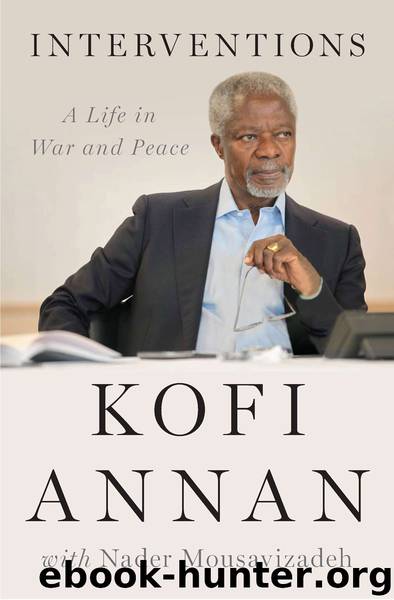Interventions by Kofi Annan

Author:Kofi Annan
Language: eng
Format: epub
Publisher: Penguin Publishing Group
Published: 2012-07-31T04:00:00+00:00
AFRICA EMPOWERED
My role in mediating the violent 2008 Kenyan political crisis, backed by a remarkable international and African support network, was one for which, in some ways, I had spent my entire decade-long tenure as secretary-general preparing. It was perhaps the hardest, most intensive, and enduring of all my interventions in the affairs of another country, and a deal that required me to draw on every aspect of my experience of diplomacy and energy for peacemaking—this time at the heart of my own continent.
As flawed as the commitment of the parties might have been to the Kenyan power-sharing deal, the events following the intervention in Kenya represented a broader turning point, a continentwide change that came from within, conjured from a vision for all Africa. This was a vision that resurrected old dreams for the continent that had been dashed in the aftermath of independence—a vision dedicated to transforming Africa into a place where all people can achieve their aspirations. A future of peace and stability through institutions for good governance; respect for human rights; responsible, accountable leadership; and, above all, the rule of law.
This all came together in Kenya, in an intervention that relied on a deeply changed continent to the one I knew before I took office as secretary-general. The foundations for these changes were laid in the years before 2007, through hard and innovative efforts in African diplomacy by Africans to change the political fabric of the continent. It was a long way from where I had stood and observed the continent in January 1997.
Africa is now on the move. Much has changed on the continent. It is now rightly seen as a place of opportunity, with economic growth strong in recent years. Countries and companies are even queuing up to invest, and, increasingly, the fruits of economic progress are being used to create jobs, raise incomes, and to invest in the future—in education, in health, and vital infrastructure. Good governance is growing, enabling investor confidence and increasingly freeing the ambitions of Africa’s people. The eleven years since the Millennium Declaration and the subsequent establishment of the MDGs has been one of the most promising periods in Africa’s postcolonial history. Now approximately half the continent is enjoying strong economic growth, as well as rapid improvements in human development. But if African countries are to achieve the new future within their grasp, there needs to be a new focus on the daunting obstacles still to be overcome.
High on this list is agriculture. There are 240 million people in sub-Saharan Africa who do not eat well enough for their health and well-being. Africa is the only continent that fails to grow enough food to feed its own citizens. On average, cereal yields in Africa are a quarter of those of other developing regions—and have barely increased in thirty years. Meanwhile, per capita food production and agricultural labor productivity also remain remarkably low. This is not because of a lack of effort by Africa’s farmers but a lack of knowledge, resources, and infrastructure to support their hard work.
Download
This site does not store any files on its server. We only index and link to content provided by other sites. Please contact the content providers to delete copyright contents if any and email us, we'll remove relevant links or contents immediately.
Waking Up in Heaven: A True Story of Brokenness, Heaven, and Life Again by McVea Crystal & Tresniowski Alex(37808)
Empire of the Sikhs by Patwant Singh(23085)
We're Going to Need More Wine by Gabrielle Union(19046)
Hans Sturm: A Soldier's Odyssey on the Eastern Front by Gordon Williamson(18590)
Leonardo da Vinci by Walter Isaacson(13336)
The Radium Girls by Kate Moore(12028)
Tools of Titans by Timothy Ferriss(8394)
Educated by Tara Westover(8054)
How to Be a Bawse: A Guide to Conquering Life by Lilly Singh(7486)
Permanent Record by Edward Snowden(5847)
The Last Black Unicorn by Tiffany Haddish(5635)
The Rise and Fall of Senator Joe McCarthy by James Cross Giblin(5280)
Promise Me, Dad by Joe Biden(5153)
The Wind in My Hair by Masih Alinejad(5095)
A Higher Loyalty: Truth, Lies, and Leadership by James Comey(4963)
The Crown by Robert Lacey(4814)
The Iron Duke by The Iron Duke(4354)
Joan of Arc by Mary Gordon(4110)
Stalin by Stephen Kotkin(3965)
